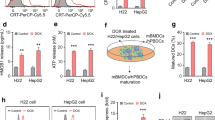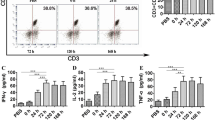Abstract
Objective
To evaluate the efficacy of cationic liposome-mediated CD40 ligand (CD40L) gene therapy for hepatocellular carcinoma.
Methods
1×106 of parental H22 cells or H22 cells transfected with the expression vector containing murine CD40L cDNA encoding the entire coding region (pcDNA3.1+-mCD40L) were inoculated subcutaneously into the left flanks of syngenic BALB/C mice. The tumor-bearing mice (tumor nodules 10 mm in maximal diameter) received the treatment of the intratumoral injection of pcDNA3.1+-mCD40L/Transfectam, pcDNA3.1+, or phosphate-buffered saline (PBS), or no treatment. The mice were monitored for tumor growth weekly. We examined mCD40L messenger ribonucleic acid (mRNA) expression by reverse transcription polymerase chain reaction (RT-PCR) and the histologic changes in tumors at two weeks after intratumoral injection using immunohistochemical staining of tumor tissues.
Results
All mice inoculated with parental H22 cells developed a tumor subcutaneously, and the tumor size increased progressively within three weeks. However, the mice receiving H22-CD40L cells exhibited complete regression of the tumor two weeks after tumor cell inoculation. The tumor-bearing animals with the treatment of pcDNA3.1+ or PBS, or without treatment had progressive tumor growth, while those mice treated with pcDNA3.1+-mCD40L exhibited a significant inhibition of tumor growth. RT-PCR analysis showed that 783-bp fragments corresponding to the mCD40L mRNA were amplified only from pcDNA3.1+-mCD40L treated tumors. The tumor samples from pcDNA3.1+-mCD40L-treated mice showed significant lymphocyte infiltration, apoptotic bodies, and confluent necrosis in the tumor tissues.
Conclusion
The tumorigenicity of CD40L-expressing cells was abrogated when the cells were implanted subcutaneously. In vivo gene therapy of established liver tumor nodules in mice by the intratumoral injection of pcDNA3.1+-mCD40L led to significant tumor inhibition. There was mCD40L mRNA expression in the tissues from pcDNA3.1+-mCD40L-treated tumors. The intratumoral injection of pcDNA3.1+-mCD40L induced a strong inflammatory, mainly lymphocytic infiltration of the tumor, and increased the necrotic rate of the neoplastic cells.
Similar content being viewed by others
References
Bereznaya, N.M., Chekhun, V.F., 2007. Expression of CD40 and CD40L on tumor cells: the role of their interaction and new approach to immunotherapy. Exp. Oncol., 29(1):2–12.
Bullens, D.M., Kasran, A., Thielemans, K., Bakkus, M., Ceuppens, J.L., 2001. CD40L-induced IL-12 production is further enhanced by the Th2 cytokines IL-4 and IL-13. Scand. J. Immunol., 53(5):455–463. [doi:10.1046/j.1365-3083.2001.00900.x]
Buning, C., Kruger, K., Sieber, T., Schoeler, D., Schriever, F., 2002. Increased expression of CD40 ligand on activated T cells of patients with colon cancer. Clin. Cancer Res., 8(4):1147–1151.
Chouaib, S., Asselin-Paturel, C., Mami-Chouaib, F., Caignard, A., Blay, J.Y., 1997. The host-tumor immune conflict: from immunosuppression to resistance and destruction. Immunol. Today, 18(10):493–497. [doi:10.1016/S0167-5699(97)01115-8]
Diehl, L., Den Boer, A.T., Schoenberger, S.P., ven der Voort, E.I., Schumacher, T.N., Melief, C.J., Offringa, R., Toes, R.E., 1999. CD40 activation in vivo overcomes peptide-induced peripheral cytotoxic T-lymphocyte tolerance and augments anti-tumor vaccine efficacy. Nat. Med., 5(7):774–779. [doi:10.1038/10495]
Friedlander, P.L., Delaune, C.L., Abadie, J.M., Touos, M., LaCour, J., Marrero, L., Zhong, Q., Kolls, J.K., 2003. Efficacy of CD40 ligand gene therapy in malignant mesothelioma. Am. J. Respir. Cell Mol. Biol., 29(3 Pt 1):321–330. [doi:10.1165/rcmb.2002-0226OC]
Gabrilovich, D.I., Chen, H.L., Girgis, K.P., Cunningham, H.T., Meny, G.M., Nadaf, S., Kavanaugh, D., Carbone, D.P., 1996. Production of vascular endothelial growth factor by human tumors inhibits the functional maturation of dendritic cells. Nat. Med., 2(10):1096–1103. [doi:10.1038/nm1096-1096]
Georgopoulos, N.T., Merrick, A., Scott, N., Selby, P.J., Melcher, A., Trejdosiewicz, L.K., 2007. CD40-mediated death and cytokine secretion in colorectal cancer: a potential target for inflammatory tumour cell killing. Int. J. Cancer, 121(6):1373–1381. [doi:10.1002/ijc.22846]
Grewal, I.S., Flavell, R.A., 1998. CD40 and CD154 in cell-mediated immunity. Annu. Rev. Immunol., 16(1):111–135. [doi:10.1146/annurev.immunol.16.1.111]
Harada, M., Tamada, K., Abe, K., Yasumoto, K., Kimura, G., Nomoto, K., 1998. Role of the endogenous production of interleukin 12 in immunotherapy. Cancer Res., 58(14):3073–3077.
Hussain, S.A., Ganesan, R., Hiller, L., Murray, P.G., El-Magraby, M.M., Young, L., James, N.D., 2003. Proapoptotic genes BAX and CD40L are predictors of survival in transitional cell carcinoma of the bladder. Br. J. Cancer, 88(4):586–592. [doi:10.1038/sj.bjc.6600765]
Jiang, Y.F., Su, X.S., Gong, G.Z., 2005a. Cloning and expression of murine CD40 ligand gene. World Chin. J. Digestol., 13(11):1287–1290 (in Chinese).
Jiang, Y.F., He, Y., Gong, G.Z., 2005b. Construction of recombinant eukaryotic expression plasmid containing murine CD40 ligand gene and its expression in H22 cells. World J. Gastroenterol., 11(2):182–186.
Li, Z.L., Tian, P.X., Xue, W.J., Wu, J., 2006. Co-expression of sCD40LIg and CTLA4Ig mediated by adenovirus prolonged mouse skin allograft survival. J. Zhejiang Univ. Sci. B., 7(6):436–444. [doi:10.1631/jzus.2006.B0436]
Loskog, A., Biorkland, A., Brown, M.P., Korsgren, O., Malmstrom, P.V., Totterman, T.H., 2001. Potent antitumor effects of CD154 transduced tumor cells in experimental bladder cancer. J. Urol., 166(3):1093–1097. [doi:10.1016/S0022-5347(05)65928-9]
Loskog, A., Totterman, T.H., Bohle, A., Brandau, S., 2002. In vitro activation of cancer patient-derived dendritic cells by tumor cells genetically modified to express CD154. Cancer Gene Ther., 9(10):846–853. [doi:10.1038/sj.cgt.7700507]
Mach, F., Schonbeck, U., Sukhova, G.K., Bourcier, T., Bonnefoy, J.Y., Pober, J.S., Libby, P., 1997. Functional CD40 ligand is expressed on human vascular endothelial cells, smooth muscle cells, and macrophages: implications for CD40-CD40 ligand signaling in atherosclerosis. Proc. Natl. Acad. Sci. USA, 94(5):1931–1936. [doi:10.1073/pnas.94.5.1931]
Melero, I., Mazzolini, G., Naraiza, I., Qian, C., Chen, L., Prieto, J., 2001. IL-12 gene therapy for cancer: in synergy with other immunotherapies. Trends Immunol., 22(3):113–115. [doi:10.1016/S1471-4906(00)01824-X]
Noguchi, M., Imaizumi, K., Kawabe, T., Wakayama, H., Horio, Y., Sekido, Y., Hara, T., Hashimoto, N., Takahashi, M., Shimokata, K., Hasegawa, Y., 2001. Induction of antitumor immunity by transduction of CD40 ligand gene and interferon-gamma gene into lung cancer. Cancer Gene Ther., 8(6):421–429. [doi:10.1038/sj.cgt.7700320]
Ottaiano, A., Pisano, C., de Chiara, A., Ascierto, P.A., Botti, G., Barletta, E., Apice, G., Gridelli, C., Iaffaioli, V.R., 2002. CD40 activation as potential tool in malignant neoplasms. Tumori, 88(5):361–366.
Peter, I., Naweath, M., Kamarashev, J., Odermatt, B., Mezzacasa, A., Hemini, S., 2002. Immunotherapy for murine K1735 melanoma: combinatorial use of recombinant adenovirus expressing CD40L and other immunomodulators. Cancer Gene Ther., 9(7):597–605. [doi:10.1038/sj.cgt.7700475]
Roy, M., Waldschmidt, T., Aruffo, A., Ledbetter, J.A., Noelle, R.J., 1993. The regulation of the expression of gp39, the CD40 ligand, on normal and cloned CD4+ T cells. J. Immunol., 151(5):2497–2510.
Ruiz, J., Qian, C., Drozdzik, M., Prieto, J., 1999. Gene therapy of viral hepatitis and hepatocellular carcinoma. J. Viral. Hepat., 6(1):17–34. [doi:10.1046/j.1365-2893.1999.6120 136.x]
Ruiz, J., Mazzolini, G., Sangro, B., Qian, C., Prieto, J., 2001. Gene therapy of hepatocellular carcinoma. Dig. Dis., 19(4):324–332. [doi:10.1159/000050699]
Saudemont, A., Buffenoir, G., Denys, A., Desreumaux, P., Jouy, N., Hetuin, D., Banters, F., Fenanx, P., Quesnel, B., 2002. Gene transfer of CD154 and IL12 cDNA induces an anti-leukemic immunity in a murine model of acute leukemia. Leukemia, 16(9):1637–1644. [doi:10.1038/sj.leu.2402590]
Schmitz, V., Barajas, M., Wang, L., Peng, D., Puarte, M., Prieto, J., Qian, C., 2001. Adenovirus-mediated CD40 ligand gene therapy in a rat model of orthotopic hepatocellular carcinoma. Hepatology, 34(1):72–81. [doi:10.1053/jhep.2001.25757]
Sotomayor, E.M., Borrello, I., Tubb, E., Rattis, F.M., Bien, H., Lu, Z., Fein, S., Schoenberger, S., Levitsky, H.I., 1999. Conversion of tumor-specific CD4+ T-cell tolerance to T-cell priming through in vivo ligation of CD40. Nat. Med., 5(7):780–787. [doi:10.1038/10503]
Sun, Y., Peng, K., Lecanda, J., Schmitz, V., Barajas, M., Qian, C., Prieto, J., 2000. In vivo gene transfer of CD40 ligand into colon cancer cells induces local production of cytokines and chemokines, tumor eradication and protective antitumor immunity. Gene Ther., 7(17):1467–1476. [doi:10.1038/sj.gt.3301264]
Tada, Y., O-Wang, J., Yu, L., Shimozato, O., Wang, Y.Q., Takiguchi, Y., Tatsumi, K., Kuriyama, T., Takenaga, K., Sakiyama, S., Tagawa, M., 2003. T-cell-dependent antitumor effects produced by CD40 ligand expressed on mouse lung carcinoma cells are linked with the maturation of dendritic cells and secretion of a variety of cytokines. Cancer Gene Ther., 10(6):451–456. [doi:10.1038/sj.cgt.7700584]
Tang, Z.Y., 2001. Hepatocellular carcinoma-cause, treatment and metastasis. World J. Gastroenterol., 7(4):445–454.
Toutirais, O., Gervais, A., Cabillic, F., Le Gallo, M., Coudrais, A., Leveque, J., Catros-Quemener, V., Genetet, N., 2007. Effects of CD40 binding on ovarian carcinoma cell growth and cytokine production in vitro. Clin. Exp. Immunol., 149(2):372–377.
von Bergwelt-Baildon, M., Maecker, B., Schultze, J., Gribben, J.G., 2004. CD40 activation: potential for specific immunotherapy in B-CLL. Ann. Oncol., 15(6):853–857. [doi:10.1093/annonc/mdh213]
Wendtner, C.M., Kofler, D.M., Theiss, H.D., Kurzeder, C., Buhmann, R., Schweighofer, C., Perabo, L., Danhanser-Riedl, S., Baumert, J., Hiddemann, W., Hallek, M., Bunning, H., 2002. Efficient gene transfer of CD40 ligand into primary B-CLL cells using recombinant adenoassociated virus (rAAV) vectors. Blood, 100(5):1655–1661.
Wierda, W.G., Gantwell, M.J., Woods, S.J., Rassenti, L.Z., Prussak, C.E., Kipps, T.J., 2000. CD40-ligand (CD154) gene therapy for chronic lymphocytic leukemia. Blood, 96(9):2917–2924.
Yanagi, K., Nagayama, Y., Nakao, K., Saeki, A., Matsumoto, K., Icshikawa, T., Ishikawa, H., Hamasaki, K., Ishii, N., Eguchi, K., 2003. Immuno-gene therapy with adenoviruses expressing fms-like tyrosine kinase 3 ligand and CD40 ligand for mouse hepatoma cells in vivo. Int. J. Oncol., 22(2):345–351.
Author information
Authors and Affiliations
Corresponding author
Additional information
Project (No. Y02-42) supported by the Scientific Fund of Department of Health of Hunan Province, China
Rights and permissions
About this article
Cite this article
Jiang, Yf., Ma, J., He, Y. et al. Cationic liposome-mediated transfection of CD40 ligand gene inhibits hepatic tumor growth of hepatocellular carcinoma in mice. J. Zhejiang Univ. Sci. B 10, 7–13 (2009). https://doi.org/10.1631/jzus.B0820178
Received:
Accepted:
Published:
Issue Date:
DOI: https://doi.org/10.1631/jzus.B0820178




